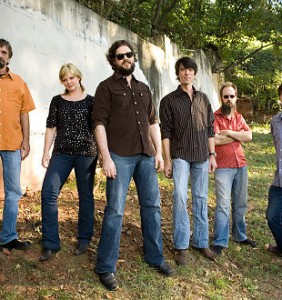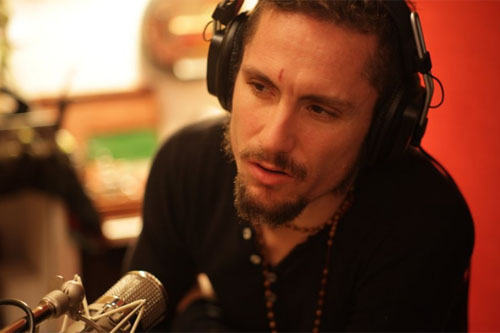
Drive-By Truckers have a ‘Happy Ending’
By Mike Snider, USA TODAY
“When we go to see the Truckers play, we wear diapers so we don’t have to go to the bathroom,” declares a young female fan early on in The Secret to a Happy Ending, a documentary about Southern rock band the Drive-By Truckers.
Similar devotion to the Athens, Ga.-based Truckers led Washington, D.C.-area filmmaker Barr Weissman to spend nearly six years making what he calls “a love letter to rock ‘n’ roll.”
The film is making the rounds at festivals, including a closing-night screening at the Atlanta Film Festival on Friday, and Weissman hopes for a limited theatrical release. He also expects to get the film to DVD, as well as broadcast and digital channels such as iTunes, Amazon and Netflix later this year.
Happy Ending arrives at an opportune time for the Truckers, who have a new album, The Big To-Do, and a growing fan base. To-Do earned the band its highest ranking yet on Billboard’s album chart when it made its debut at No. 22 last month; a tour underway includes 11 dates opening for Tom Petty and The Heartbreakers.
“I don’t want anyone to ever think this film is a promotional tool or was made with that in mind,” says Weissman, a freelance filmmaker whose jobs include producing segments for the National Memorial Day Concert broadcast on PBS. “I made it to tell a story, but if it ties into the synergy of the new record and the touring with Tom Petty to help them get the success they deserve, that would be great.”
The story began in 2003 when Weissman, now 54, attended his first of several Truckers concerts. The band’s dark, gritty representations of forgotten Southerners struck Weissman as the real thing. “I told them when I started it that they reminded me of why I loved rock music,” he says.
But band leaders Patterson Hood and Mike Cooley were reluctant initially. “I was like, hell no. It’s not time for something like that,” recalls Hood, whose father, David Hood, played bass in the legendary Muscle Shoals rhythm section.
“I was of the same mind. It might be something cool at some point,” says Cooley.
“Give me five minutes,” Weissman pressed. He told the band members they were “a more-than-worthy subject,” noting their do-it-yourself ethic. (They produced their own albums and sold them at their shows until the Lost Highway label picked up 2001’s Southern Rock Opera.)
Weissman provided copies of his work, including A Short Piece of Our Lives, a documentary about a woman dying of cancer.
“He seemed to know how to approach us,” says Cooley, cupping a cold beer before a set at the recent South By Southwest music festival in Austin. “The more I learned what he was about, you know, this might be something really cool. It turned out that way.”
Weissman’s small crew, which sometimes included wife Linda, began tracking the band in January 2005 and continued through spring 2006, including the recording of A Blessing and a Curse and the subsequent tour. “They got what we were about,” Hood says. “Then, of course, it drug out five years from there. That’s a whole nother story.”
The film chronicles the band’s formation and captures its intense live performances with footage from the Bonnaroo Festival in Tennessee, as well as concerts across the USA. Weissman interviewed Hood, Cooley, then-guitarist Jason Isbell, bass player Shonna Tucker, who married Isbell before joining the band in 2003, drummer Brad Morgan and guitarist John Neff, an original member of the band who rejoined in 2006. Also in the band now is New York-area keyboardist Jay Gonzalez.
Universal themes such as teenage alienation and the liberating power of music emerge, allowing the film to appeal beyond current fans to a wider swath of music and movie lovers. “I wouldn’t be here today” without rock music, Hood says in the film. “It saved my life as a teenager.”
Origins of some Truckers’ songs are unveiled. In the elegiac Space City, Cooley considers his grandfather’s thoughts upon the death of Cooley’s grandmother. “I just couldn’t imagine what it would be like to find yourself alone at 80 for the first time in your life,” he says in the film.
Similarly, Hood talks about writing Sands of Iwo Jima, about his great-uncle George A. Johnson, a World War II veteran. “It occurred to me that I only wrote about bad things,” the singer muses at Johnson’s home in the film. “I thought, ‘Why can’t I write a song about George A.?’ “
The film delves into subjects as diverse as the legacies of the Tennessee Valley Authority and the late Alabama Gov. George Wallace and the prevalence of alcoholism and trailer-park meth labs. “This is a very political band. What they understand is the power of telling stories,” says Bryant Simon, director of American studies at Temple University, who appears in the film. “This is the other side of America where poverty is still the norm.”
Just as Weissman began editing, Isbell and Tucker divorced, and the band, weary of the recording-tour cycle, appeared on the verge of disintegration.
“I said, ‘Give us a little time to figure out what happens next or this is going to suck,'” Hood says.
Still, when Weissman filmed the band’s 2006 New Year’s Eve show in Atlanta, “there was definitely a sense these would be the last shows,” he says. “Afterward, Patterson said, ‘I guess we are going to keep on because I think the friction would create good art.’ “
Isbell, who left to form his own group, the 400 Unit, consented to a follow-up interview with Weissman. “He really impressed me with being willing to talk about it at what must have been a pretty painful time for him,” Weissman says. “The interview is a lot of the backbone of the film.”
For the current Truckers, “it’s a good time right now,” Hood says, sitting across from Cooley. “It’s a fun new show to play. The new songs are really working live.”
A movie nut who has written several songs for film soundtracks, Hood says Happy Ending “holds up as a piece of filmmaking. If I remove myself from the equation and the fact that I am in it and look at it objectively, it’s a really well-made movie.”
The screening schedule for The Secret to a Happy Ending:
April 23 Atlanta Film Festival
June 2 Sound Unseen, Minneapolis
June 2-6: Little Rock Film Festival
June 3-4: Duluth, Minn.
June 25-27: DocuWest Festival, Denver
Aug. 13-15 Northwest Film Forum, Seattle
Nov. 13 Ancient City Film Festival, St. Augustine, Fla.
